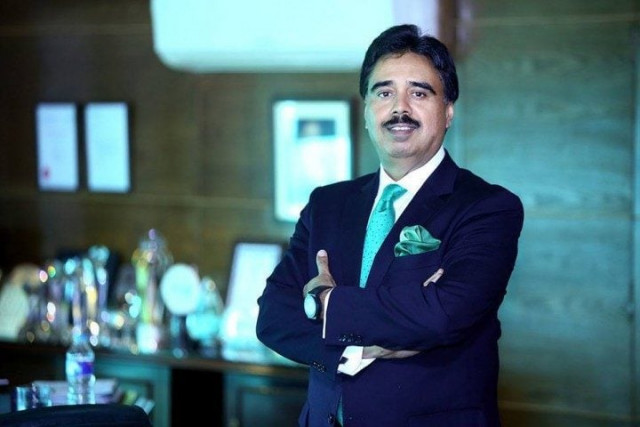This Pakistani bootstrapped his company all the way to IPO
Salim Ghauri's, Netsol, is regarded as one of the most successful software development firms emanating from the...

PHOTO: TECH IN ASIA
Pakistan’s IT exports exceed $2 billion, says PSEB chief
But this isn’t a story of overnight success. Salim has had to survive some pretty testing times and operate on very lean methodologies to make it work. His ascension to the upper echelons of the tech ecosystem is a result of several years of painstaking efforts.
Netsol was founded after Salim returned to his country of birth after a stint as an IT consultant in Australia. His startup began small – the initial team comprised of just four people working out of a tiny office in Lahore – but Salim had grand ambitions.
“I’m a software guy who builds software and the idea was to mold this passion into a company the world would notice,” Salim tells Tech in Asia. “Infosys was doing very well and there was a belief that we could also do it,” he says, name-checking India’s IT outsourcing titan.
Smooth operator
In the mid-1990s, the internet was still an almost unheard-of phenomenon in Pakistan. But it was starting out. Signing clients was a challenge, but one Salim embraced whole-heartedly. He didn’t have a sales team for the first five years of operations and relied on “personal charm” to make an impression. Breathing space came after a German luxury car manufacturer signed a contract with Netsol in 1996 for enterprise solutions for its finance wing.
“It’s never about companies, it’s always about people. If you develop a relationship, when you come with ideas and enthusiasm, people trust you to deliver,” says Salim.
Snaring the first deal proved to be a watershed moment for the fledgling company. The contract allowed it to understand customer psyche and focus on building solutions relevant to client needs. In 2000, Netsol had an even bigger break when the same firm signed a US$2 million contract to meet a larger suite of requirements.
Focus: Need to market IT industry: Rahman
“As work with blue chip companies expanded, it helped us strengthen our position in global markets. They were all very impressed by our processes and ability to deliver,” says Salim.
It’s never about companies, it’s always about people.
But the dotcom crash of 2001, coupled with the fallout from the 9/11 attacks, brought immense pressure on Salim. Clients were sceptical of dealing with a company operating from a region considered to be the epicentre of terrorism. Salim says he was urged to move his firm to another country, possibly the Philippines or somewhere else in Southeast Asia. However, he resisted these calls and remained steadfast in his desire to build a world-class company from Pakistan.
“It was scary. We didn’t know what would happen tomorrow, how we would live the next day,” says Salim. “But it never came to my mind to quit. No doubt there were periods of frustration, but we kept the faith.”
Capturing a niche
In the mid-2000s Netsol made a strategic decision to concentrate solely on products. Up until then the firm had provided a range of services, including business process outsourcing, call centers, and software. However, to create a strong brand and provide value-addition, the founder came to the conclusion that it needed to market and license its own products.
In the meantime, the team had been working steadily to obtain global certification for quality standards. It was able to gain the capability maturity model integration (CMMI) certificate, catapulting it to an elite class. CMMI is a process improvement appraisal program certified by Carnegie Mellon University and aims to determine how well the internal functions of a company operate and how optimized it is to respond to business needs. CMMI Level 5, the highest a company can reach, was obtained by Netsol in 2006, putting it at par with giants like Infosys. Fewer than 150 companies globally have managed to reach this level, the firm claims.
“When you sell your own software, you are able to charge the best rates […] When we realised that, we decided to stick with this model rather than accept outsourcing,” explains Salim.
Netsol was now flexing its muscles on the global stage. It was listed on both NASDAQ as well as the Karachi Stock Exchange (now Pakistan Stock Exchange) by the mid-2000s. It also had a vast roster of clients, including significant presence in China, Japan, Croatia, Thailand, and Australia. Many large automobile manufacturing firms have been loyal clients for decades.
When you do a deal like this, you are considered to be a part of the big leagues
The company’s core expertise lies in its enterprise products Ascent and Mobility. Without getting into technical jargon, they’re mainly aimed at the financial services and leasing sectors, helping companies in these verticals make empowered business decisions.
IPO: Hi-Tech Lubricants’ book-building on Jan 6-7
Just last month, Netsol signed a gargantuan US$100 million contract with an unnamed firm. Salim declined to reveal the name of the company, but did say that it’s an existing client, a multinational firm that will be upgrading its systems in 12 different countries. A contract of this magnitude is certainly unprecedented in Pakistan’s tech industry and has the potential to be a game-changer.
“When you do a deal like this you are considered to be a part of the big leagues. Large banks and financial institutions will choose to do business with you,” asserts Salim.
Prior to this new contract, the largest deal Netsol had signed was a US$20 million agreement with a company in Thailand.
So what’s the future?
Just as the success of Infosys and other Indian IT firms helped spawn the current generation of tech entrepreneurs in India, it’s likely that Netsols’ traction will have a similar multiplier effect in Pakistan. The firm is certainly trying to assist the process as much as it can. It’s setting up an incubator to help budding entrepreneurs take advantage of its global reach and connections whilst also giving them free office space and access to mentors.
Salim says they’re looking to assist entrepreneurs who have ideas with a potential “global impact.” He doesn’t specify precise verticals which interest him but does hint at playing a more overt role as an investor.
As for Netsol itself, the entrepreneur explains the firm’s planning to accelerate growth significantly in the coming months and years. “We’ve had a slow growth trajectory so far, but now we have some of the best products in the world and meet global standards. It’ll be our failure if in 5 years we’re not a totally different company with different numbers. It’s our time to grow exponentially,” exhorts Salim.
After so long in the business, he has words of advice for budding entrepreneurs out there. “Always invest in people,” says Salim. “We were able to get great people together, we trusted them to deliver, and empowered them. As long as you try new things, it doesn’t matter if you fail. That’s the reason for our success.”
New wave in tech: hacking the brain
He’s similarly upbeat about the future of Pakistan’s IT industry. “Growing the ecosystem takes time, maybe up to 30 years. But we’re already exporting hundreds of millions of dollar’s worth of services, and in the next few years I expect the figure to rise substantially.”
This story originally appeared on Tech In Asia.



















COMMENTS
Comments are moderated and generally will be posted if they are on-topic and not abusive.
For more information, please see our Comments FAQ